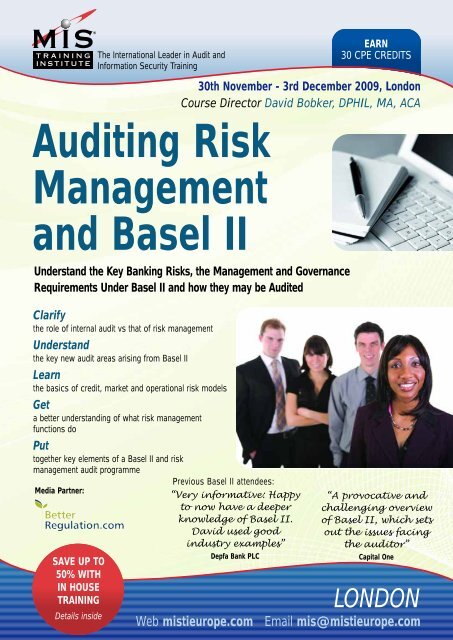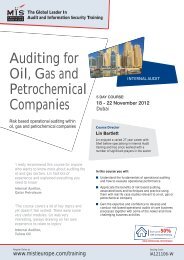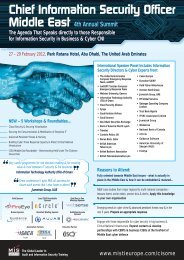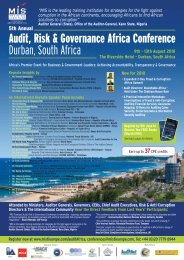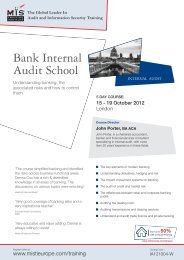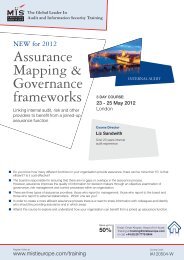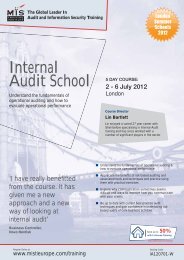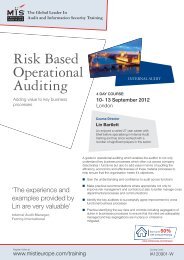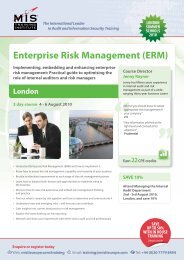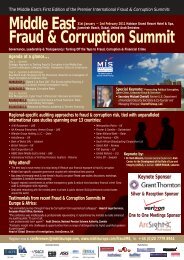Auditing Risk Management and Basel II - MIS Training
Auditing Risk Management and Basel II - MIS Training
Auditing Risk Management and Basel II - MIS Training
You also want an ePaper? Increase the reach of your titles
YUMPU automatically turns print PDFs into web optimized ePapers that Google loves.
The International Leader in Audit <strong>and</strong>Information Security <strong>Training</strong>EARN30 CPE CREDITS<strong>Auditing</strong> <strong>Risk</strong><strong>Management</strong><strong>and</strong> <strong>Basel</strong> <strong>II</strong>30th November - 3rd December 2009, LondonCourse Director David Bobker, DPHIL, MA, ACAUnderst<strong>and</strong> the Key Banking <strong>Risk</strong>s, the <strong>Management</strong> <strong>and</strong> GovernanceRequirements Under <strong>Basel</strong> <strong>II</strong> <strong>and</strong> how they may be AuditedClarifythe role of internal audit vs that of risk managementUnderst<strong>and</strong>the key new audit areas arising from <strong>Basel</strong> <strong>II</strong>Learnthe basics of credit, market <strong>and</strong> operational risk modelsGeta better underst<strong>and</strong>ing of what risk managementfunctions doPuttogether key elements of a <strong>Basel</strong> <strong>II</strong> <strong>and</strong> riskmanagement audit programmePrevious <strong>Basel</strong> <strong>II</strong> attendees:Media Partner:“Very informative: Happyto now have a deeperknowledge of <strong>Basel</strong> <strong>II</strong>.David used goodindustry examples”SAVE UP TO50% WITHIN HOUSETRAININGDetails insideDepfa Bank PLC“A provocative <strong>and</strong>challenging overviewof <strong>Basel</strong> <strong>II</strong>, which setsout the issues facingthe auditor”Capital OneLONDONWeb mistieurope.com Email mis@mistieurope.com
<strong>Auditing</strong> <strong>Risk</strong> <strong>Management</strong><strong>and</strong> <strong>Basel</strong> <strong>II</strong>Underst<strong>and</strong> the Key Banking <strong>Risk</strong>s, the <strong>Management</strong> <strong>and</strong> GovernanceRequirements Under <strong>Basel</strong> <strong>II</strong> <strong>and</strong> how they may be Audited30th November -3rd December 2009,LondonSeminar Focus & Features<strong>Basel</strong> <strong>II</strong> has now been largely implemented in many countries, except for the approval <strong>and</strong> implementation of advanced models which willhappen mainly during 2008/2009. Internal audit departments are now busy planning their first audits in a <strong>Basel</strong> <strong>II</strong> environment <strong>and</strong> arefinding much has changed from the traditional approaches.The first thing is that <strong>Basel</strong> <strong>II</strong> has brought a significant <strong>and</strong> explicit focus on risk management <strong>and</strong> corporate governance which was more inthe background previously. A major innovation is the requirement for banks to have an Internal Capital Adequacy Assessment processwhereby the board must, at least annually, self assess the solvency of the bank. This ICAAP is subject to rigorous review by banksupervisors under Pillar 2 <strong>and</strong> is required to be reviewed by internal audit. Secondly, since the advent of <strong>Basel</strong> I back in 1988, most bankshave now set up various types of risk management function staffed by risk management professionals carrying out a range of activities. Thishas put a focus on the role of internal audit in the new world <strong>and</strong> whether it is able to carry out its new responsibilities <strong>and</strong> deliverexpectations.This four day course focuses on the main banking risks, the management <strong>and</strong> governance requirements under <strong>Basel</strong> <strong>II</strong> <strong>and</strong> how they may beaudited. The programme is designed to help internal auditors focus on the key areas where they may need to upgrade their technicalknowledge <strong>and</strong> possibly engage the services of external specialists so as to ensure they provide the necessary level of assurance to theboard of directors.Course Director David Bobker DPHIL, MA, ACAAfter completing a DPhil in mathematics at Oxford University, David worked as a manager in a small, diverse, banking <strong>and</strong> property companyin London. He left the company to train as a chartered accountant with Peat Marwick Mitchell (KPMG) specialising in the insurance industry<strong>and</strong> statistical auditing. He later moved to Touche Ross, where he provided regulatory compliance advice mainly to wholesale banks <strong>and</strong>broker dealers.In 1989 David was seconded to the Building Societies Commission as a Supervisor. He had policy responsibility for capital adequacy whichincluded UK implementation of European capital adequacy rules <strong>and</strong> new rules on capital instruments for building societies. After leaving theCommission he moved into the internal audit profession at Alliance & Leicester where he was Head of Group Audit <strong>and</strong> Group ComplianceOfficer for 7 years. In order to provide a more soundly based internal audit service he developed specialist audit software to ensure fullyconcise, logical analysis underpinned all internal audits.In 1998 he moved to Norwich Union as Head of Group Internal Audit. His responsibilities during those years included pioneering work onimplementing corporate governance arrangements <strong>and</strong> “enterprise risk management”, what became later Turnbull compliant systems.Involving systems of risk identification <strong>and</strong> assessment, effectiveness of controls <strong>and</strong> compliance processes together with appropriatecorporate reporting systems for the board <strong>and</strong> audit committee.David set up Real Assurance in 2001 helping clients move towards best practice in quantified risk management systems (especially forbanking industry implementing <strong>Basel</strong> <strong>II</strong>), corporate governance <strong>and</strong> compliance.In-House <strong>Training</strong>SAVE UP TO50% WITH INHOUSESave Up To 50% When You RunThis course In-houseIn-house tailored training will enableyou & your colleagues to makesignificant savings as we charge perday & not per participant so the costremains the same regardless of howmany people attend. We can offer anyof our public courses or tailor them toyour requirements. <strong>Training</strong> isavailable in all areas of Internal Audit,IT Audit, <strong>and</strong> IT SecurityIf you have 6 or more colleagues whowould be interested in one of ourcourses <strong>and</strong> you would like to makesignificant savings, contact us now;• What are your training objectives?• How many people require thetraining?• When would you like to run thetraining?• What level of experience do you<strong>and</strong> your colleagues have?• We will then email you a detailedproposal which addresses yourunique needs.You will have complete control of thetraining content <strong>and</strong> decide when it isrun. We guarantee that we will be ableto cater for all your business needs.More Great Reasons to Chooseour In-house <strong>Training</strong>:• Save money over public seminarfees• Save money on travel &accommodation• Save time on travel as the instructorwill travel to you. Furthermore, thetraining can be held at the mostconvenient time for you.• Tailor the course content; ensurethe relevance of the seminar foryour colleagues. You can tailor thestructure & methodology of yourseminar or customise the seminarTRAININGto meet theexpertise levels of the participants.• Bring the best in the business;Instructors are h<strong>and</strong>s-on, expertpractitioners who are your subjectmatter consultants when they arenot training.• Gain CPE points & certificates forthe number of training hours.Email Guy Cooper atgcooper@mistieurope.comor call+44 (0) 20 7779 8975
Day OneIntroduction <strong>and</strong> Course ObjectivesOverview• Overview of the <strong>Basel</strong> <strong>II</strong> Accord• Centrality of ICAAP• <strong>Risk</strong> management <strong>and</strong> governance• <strong>Risk</strong> management departments• Internal audit <strong>and</strong> governance• How to sort out roles <strong>and</strong> responsibilities ofinterested parties:• Internal audit• <strong>Risk</strong> management functions• Internal control units• Credit review functions• Compliance functions• <strong>Risk</strong> <strong>and</strong> business knowledge <strong>and</strong> auditcompetenceThe main banking risks <strong>and</strong> theirmanagement• A typical balance sheet• Main banking activities – how banks makemoney• Credit risk• Operational risk• Interest rate risk• Liquidity risk• Business <strong>and</strong> strategic risk• Political risk• Market riskFundamentals of quantitativeanalysis• The notion of risk• Probability distributions• Correlation <strong>and</strong> causality• Modelling• Value At <strong>Risk</strong>• Analysis of the loss curve• Approaches to constructing loss curves• Data collection <strong>and</strong> statistical models• Back testing• <strong>Risk</strong> appetite <strong>and</strong> economic capital• The meaning <strong>and</strong> importance of stress testingDay TwoOperational risk management I• Types of operational risk• Operational risk management responsibilities• <strong>Basel</strong> <strong>II</strong> requirements• Qualitative requirements for TSA• Sound practices for the management ofoperational risk• The role of the operational risk department• Operational risk policy• Operational risk reporting• The audit of operational risk managementCase Study: Barings bankOperational <strong>Risk</strong> <strong>II</strong> - The AMA• The AMA soundness st<strong>and</strong>ard• The four elements• Business environment• Internal control evaluation• Internal Data• External Data• Scenario analysis <strong>and</strong> stress testing• Correlation between loss events• Problems <strong>and</strong> issues with AMA• Internal audit of the AMA <strong>and</strong> use of specialistsCredit <strong>Risk</strong> Part I• Overview of credit risk <strong>and</strong> credit riskmanagement• Retail unsecured lending – credit scoring• Mortgage lending• Corporate lending• Public credit ratings – use <strong>and</strong> limitations• Trade finance• Commercial lending – SME sector• Collateral <strong>and</strong> guarantees• Counterpart credit risk <strong>and</strong> settlement risk• Credit derivatives <strong>and</strong> securitisation• BIS document - principles for management ofcredit risk• Credit risk management – roles <strong>and</strong>responsibilities• <strong>Auditing</strong> credit risk managementCase Study: Sub-prime crisis 2007Day ThreeCredit <strong>Risk</strong> Part <strong>II</strong> – Modelling <strong>and</strong>the Internal Ratings Basis• The three elements PD, LGD, EAD• PD modelling• Logit/probit models• The Merton equity model• Z-scoring• Loan portfolio analysis – Monte Carlo simulation• Economic capital for credit risk• The internal ratings basis in <strong>Basel</strong> <strong>II</strong>• Pre-conditions for use of IRB• Stress testing credit risk – PD migration,economic modelling• <strong>Auditing</strong> credit risk models – use of specialistsStructural interest rate risk• Interest rate instruments – bonds, swaps• Banking book <strong>and</strong> trading book• Fundamentals of interest rate analysis – pricing,duration, convexity• The spot curve <strong>and</strong> the yield curve• Gap analysis <strong>and</strong> risk assessment• Parallel shifts <strong>and</strong> twists• A simple Monte Carlo model• The <strong>Basel</strong> <strong>II</strong> stress test – 2% parallel shift• More sophisticated “Brownian motion” models• Interest rate risk management – the ALCO• The <strong>Basel</strong> <strong>II</strong> “Principles” paper• Capital assessment under Pillar 2• The audit of interest rate risk managementCase Study: US Savings <strong>and</strong> Loans crisis ofthe 1980’sLiquidity risk• What is liquidity risk• Bank runs – Northern Rock• Should banks provide capital under Pillar 2?• Cash flow forecasting• Scenario analysis <strong>and</strong> stress testing• Mitigation – liquidity, committed facilities• <strong>Basel</strong> paper on liquidity risk management• Internal audit of liquidity risk managementCase Study: Northern RockDay FourCapital Assessment Process• Pillar 2• <strong>Basel</strong> 2 principles for capital assessment• CEBS guidance• Supervisory assessment of capital• FSA proforma• Stress testing• Regulators’ concern with group risk – contagionrisk• <strong>Auditing</strong> the ICAAPCorporate governance, internal audit<strong>and</strong> risk management• Corporate governance in banks – UK, Europe,OECD, <strong>Basel</strong>• Group structures <strong>and</strong> multi-national banks• Audit Committees <strong>and</strong> <strong>Risk</strong> Committees• <strong>Risk</strong> management a key element of corporategovernance• The role of internal audit compared to the role ofrisk management• The <strong>Basel</strong> Principles of internal audit in banks• <strong>Auditing</strong> risk management functionsMarket <strong>Risk</strong>• Types of instruments – swaps, options,forwards, futures• Types of market – OTC, “pit”, electronic• Margined transactions• Trading <strong>and</strong> hedging• Payoff diagrams• Fundamentals of market risk• Derivatives, greeks <strong>and</strong> Black Scholes• Market risk capital <strong>and</strong> VAR models• Simple models• Sophisticated models• Difference between pricing models <strong>and</strong> riskmanagement models• Middle office <strong>and</strong> market risk governance• Scenario analysis <strong>and</strong> stress testing• <strong>Auditing</strong> market risk managementCase Study: MetallgesellschaftPrerequisiteBasic underst<strong>and</strong>ing ofbanking activities (wholesale,commercial <strong>and</strong> retaillending <strong>and</strong> treasuryoperations)Learning levelBasicFeeGBP £2,495Earn 30CPE Credits© <strong>MIS</strong> <strong>Training</strong> 2009
<strong>Auditing</strong> <strong>Risk</strong> <strong>Management</strong> <strong>and</strong> <strong>Basel</strong> <strong>II</strong>Underst<strong>and</strong> the Key Banking <strong>Risk</strong>s, the <strong>Management</strong> <strong>and</strong> GovernanceRequirements Under <strong>Basel</strong> <strong>II</strong> <strong>and</strong> how they may be AuditedWhen registering for this event please quote reference WEBKey topic areas• Clarify the role of internal audit vs that of risk management• Underst<strong>and</strong> the key new audit areas arising from <strong>Basel</strong> <strong>II</strong>• Learn the basics of credit, market <strong>and</strong> operational risk models• Get a better underst<strong>and</strong>ing of what risk management functions do• Put together key elements of a <strong>Basel</strong> <strong>II</strong> <strong>and</strong> risk management auditprogrammeWhy should you attend?• <strong>MIS</strong> <strong>Training</strong> Institute is the global leader in audit <strong>and</strong> infosecuritytraining, with over 30 years experience <strong>and</strong> having trained over200,000 delegates• Instructors/speakers are the most reputable in the industry• Group sizes are restricted to ensure optimum contact time with thefacilitator• Courses are constantly reviewed <strong>and</strong> revamped to meet the latestlegislative <strong>and</strong> market challenges• Gain CPE points towards your professional certification30th November - 3rd December 2009, LondonPLEASE SEND ME INFORMATION ABOUT RUNNING THIS COURSE IN-HOUSE <strong>Auditing</strong> <strong>Risk</strong> <strong>Management</strong> <strong>and</strong> <strong>Basel</strong> <strong>II</strong>(please photocopy form for additional delegates) 30th November - 3rd December 2009, London (MT031107)GBP £2,495 £+ VAT @ 15% £Gr<strong>and</strong> Total £Payment InformationYou can pay by debit/credit card online at www.mistieurope.com or call+44 (0)20 7779 8944 Cheque enclosed (payable to <strong>MIS</strong> <strong>Training</strong>) Please invoice my company PO#Please note that in completing this booking you undertake to adhere to thecancellation <strong>and</strong> payment terms listed belowSignatureDateApproving ManagerRegistration Information(fees must be paid in advance of the event)*Discounts: Please call to enquireabout corporate discounts.Discounts can not be used inconjunction with each other.PositionCancellation Policy:Please ensure you have read this carefully before submitting your registration] <strong>MIS</strong> <strong>Training</strong>operates a 20 working day cancellation policy. Any cancellations received after 20 days or anydelegate that does not attend will be subject to full payment.You may transfer to another course/conference for a transfer fee of 25% of the initial booking feeplus the difference between the value of the course/conference you are transferred to. This willbe invoiced or refunded. Please note that the replacement course/conference must take placewithin 6 months of the initial application.Alternatively you may send another colleague to the initial booked course/conference withoutincurring any additional fees.A full refund less an administration fee of £100 will be given forcancellation requests received up to 20 working days before the event. Cancellations must bemade in writing <strong>and</strong> reach the <strong>MIS</strong> office before the 20 working days deadline.5 easy ways to registerTel: +44 (0)20 7779 8944Fax completed form to: +44 (0)20 7779 8293Email: mis@mistieurope.com Web: www.mistieurope.comPost completed form to: Carlos Doughty, <strong>MIS</strong> <strong>Training</strong>, Nestor House,Playhouse Yard, London EC4V 5EX UKCustomer InformationTitle First name SurnameTitle/PositionOrganisationE-Mail Address (Required)AddressCountryPostcodeTelephoneFaxVAT Number (If you have one)The information you provide will be safeguarded by the Euromoney Institutional Investor PLCgroup whose subsidiaries may use it to keep you informed of relevant products <strong>and</strong> services.We occasionally allow reputable companies outside the Euromoney Institutional Investor PLCgroup to contact you with details of products that may be of interest to you. As an internationalgroup we may transfer your data on a global basis for the purposes indicated above. If youobject to contact by telephone fax or email please tick the relevant box. If you do notwant us to share your information with other reputable companies please tick this box Please send me information on In House <strong>Training</strong>Accommodation:All training venues will be confirmed 3-4 weeks prior to the course start date. <strong>MIS</strong> <strong>Training</strong>Institute has negotiated special accommodation rates in 4 star hotels in central London (Zone1) for UK courses.VAT:All delegates attending are liable to pay VAT. After the event organisations registered for VAT inthe UK may reclaim the tax.Delegates from outside the UK but within the European Community may also be able to reclaimthe VAT. Organisations outside the UK should check with their excise authority as to whichdomestic fiscal regulations apply. High Yield/No-<strong>Risk</strong>EARN30 CPE CREDITSWeb www.mistieurope.comEmail mis@mistieurope.com


